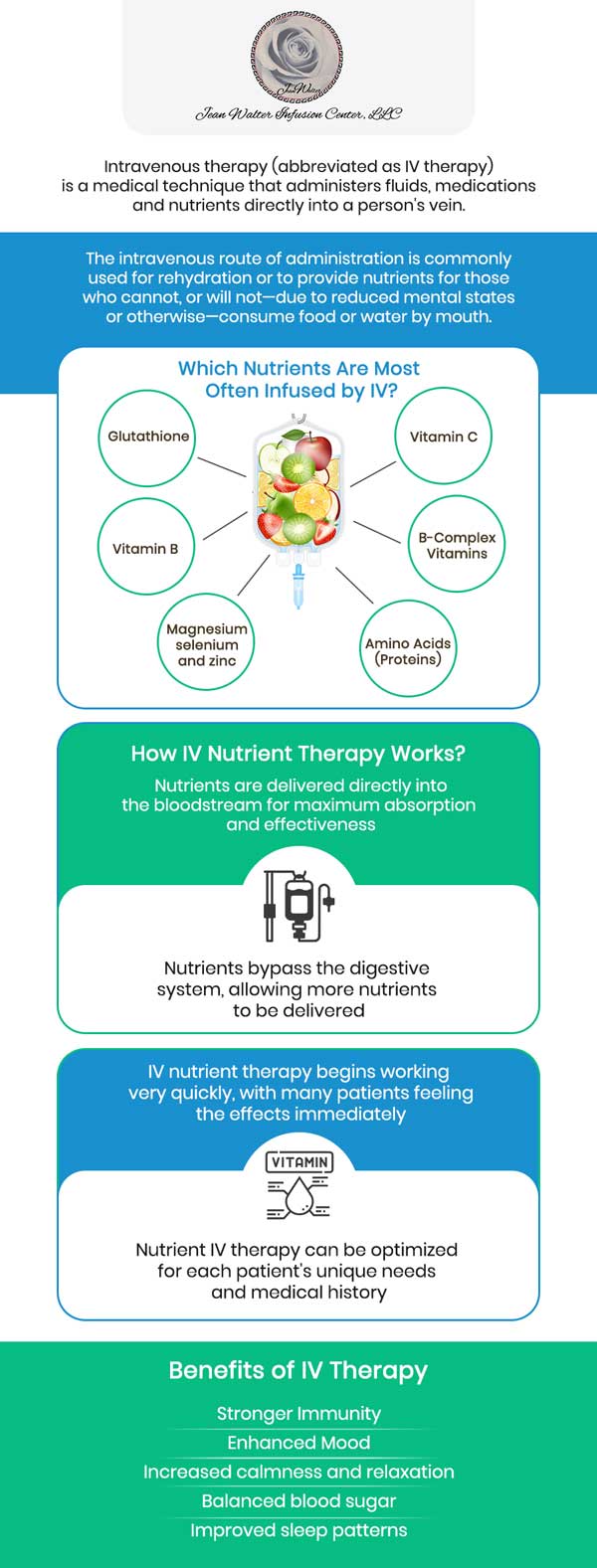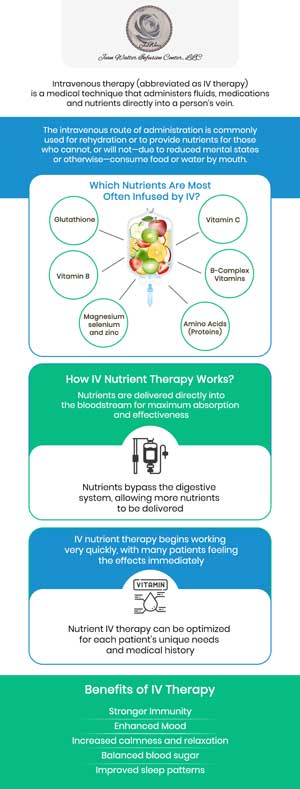What to Expect Before and After IV Therapy in North Baltimore, MD
Your energy and sense of well-being can be greatly restored with IV treatment. Dr. Nasser Nasseri, MD, and his staff at the Jean Walter Infusion Center are happy to provide IV treatment to their Maryland patients. Visit us today and let our team of professionals help keep your health and wellness in check! For more information, contact us or book an appointment online. We are conveniently located at 3333 N. Calvert St, Suite 540A, Baltimore, MD 21218.




Table of Contents:
What not to do before an IV infusion?
What to do after an IV infusion?
How long does it take to feel better after an IV infusion?
Should you rest after an infusion?
What should I expect at my first infusion?
What to Expect with IV Therapy: Dr. Nasser Nasseri, MD Guides You Through the Process from Start to Finish
There are minimal steps an individual has to take to prepare for an IV infusion, but there are certain precautions that should be considered before such a treatment at the Jean Walter Infusion Center.
Patients are advised to avoid over-the-counter medications like antihistamines and decongestants ahead of their appointment, as these can constrict blood vessels and make the treatment more challenging.
Additionally, it’s important to stay hydrated, even if the purpose of the IV is hydration itself because dehydration causes veins to constrict, complicating the infusion process. Eating before the appointment is also important to maintain blood sugar levels, as certain vitamins and minerals in the IV can lower blood sugar and blood pressure, potentially causing lightheadedness.
Engaging in mild activity such as walking before the treatment can improve circulation and enhance the effectiveness of the IV infusion, making the overall appointment smoother and more effective.
After an IV infusion at the Jean Walter Infusion Center, patients should follow simple but important steps to ensure a smooth recovery and to mitigate any potential side effects. It’s important to keep the bandage on the infusion site for at least 30 minutes post-treatment and to replace it if there is any bleeding.
If bruising or swelling occurs, a cold pack can be applied over a thin cloth to the affected area. Patients should be monitored for any persistent pain or nausea and should contact their healthcare provider if these symptoms do not subside.
Keeping the infusion site dry and clean for at least an hour after the treatment is essential, thereafter, patients can resume showering and other normal activities, though they should be careful to avoid strenuous activities that could disturb the infusion site.
The timeframe for feeling better after an IV infusion at the Jean Walter Infusion Center varies depending on the reason for the infusion and the type of treatment administered.
Generally, many of the benefits of an IV infusion are fast-acting, as the direct intravenous method allows for a more potent and immediate effect compared to oral supplements or medications.
Patients may begin to notice improvements such as increased hydration, energy boosts, and mood boosts within a few hours after the treatment. However, for more significant health issues like immune deficiencies or chronic inflammation, it might take a longer period, possibly weeks or months, to fully experience the benefits.
The need for rest after an infusion can vary based on the type of treatment and the patient’s specific health concerns. It is generally advisable for patients to consider some level of rest. Infusions, though often accompanied by minimal side effects, can lead to fatigue or a feeling of lightheadedness.
Most patients can continue with their day with minimal interruption, but avoiding strenuous physical activities that could interfere with the injection site is recommended.
Additionally, staying hydrated post-infusion can help maximize the benefits of the therapy. Depending on the complexity of the infusion therapy, especially those intended to treat more severe medical conditions, more rest might be necessary to recover from longer treatment durations and the resultant fatigue.
The initial IV infusion might take slightly longer than subsequent sessions to carefully determine the appropriate treatment and monitor for any adverse reactions. Providers may administer pre-treatment medications to prevent nausea or allergic reactions.
Patients need to come prepared, wearing comfortable clothing and bringing any necessary documents like identification and insurance information. During the infusion, a small needle will be inserted into the vein, a process that is carefully monitored by healthcare professionals to ensure correct placement. The total time spent in treatment can vary, from less than an hour to several hours, depending on the type of infusion.
Patients can also bring any items that might help them pass the time, such as books or music, to ensure a comfortable experience. Following the procedure, providers at the Jean Walter Infusion Center will coordinate any necessary follow-up treatments.
When you choose IV therapy at Jean Walter Infusion Center, Dr. Nasser Nasseri, MD ensures you are fully informed about every step of the process. Before your session, Dr. Nasseri takes time to review your health history and listen to your specific needs, allowing him to recommend a customized infusion therapy that best supports your goals. Whether you’re seeking to combat fatigue, boost hydration, or enhance your immune system, Dr. Nasseri’s personalized approach ensures the therapy is tailored specifically to your body’s needs. His team ensures that you feel comfortable, well-informed, and confident throughout the entire treatment.
During the IV therapy session, you’ll be settled in a comfortable setting while Dr. Nasseri’s experienced team administers the infusion. The process typically lasts between 30 to 60 minutes, depending on the treatment prescribed. You will receive fluids, electrolytes, and essential nutrients directly into your bloodstream, providing quicker and more efficient absorption than oral supplements. Dr. Nasseri monitors your vital signs throughout the treatment to ensure safety and effectiveness. Afterward, you’ll leave feeling rejuvenated, with follow-up guidance provided to track your progress and ensure continued well-being. Many patients notice an immediate improvement in energy levels and overall vitality following their first session, with long-lasting benefits.
IV infusion is available at the Jean Walter Infusion Center. For more information, contact us or book an appointment online. We are conveniently located at 3333 N. Calvert St, Suite 540A, Baltimore, MD 21218. We serve patients from North Baltimore MD, Dundalk MD, Halethrope MD, Ferndale MD, Yorktown MD, and surrounding areas.
Check Out Our 5 Star Reviews

Additional Services We Offer


- Infusion Therapy
- Injection Treatments
- Intravenous Immunoglobulin Therapy
- Medical Conditions
- Asthma
- Crohn’s Disease
- Fibromyalgia
- Gout
- Inflammatory Eye Disease
- Inflammatory Skin Disease
- Iron Deficiency
- Lupus
- Multiple Sclerosis
- Myositis
- Osteoporosis
- Rheumatoid Arthritis
- Ulcerative Colitis
- Vasculitis
- PRP Injections






